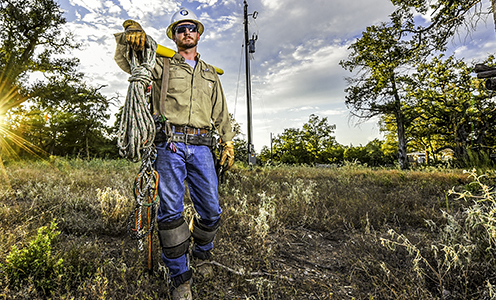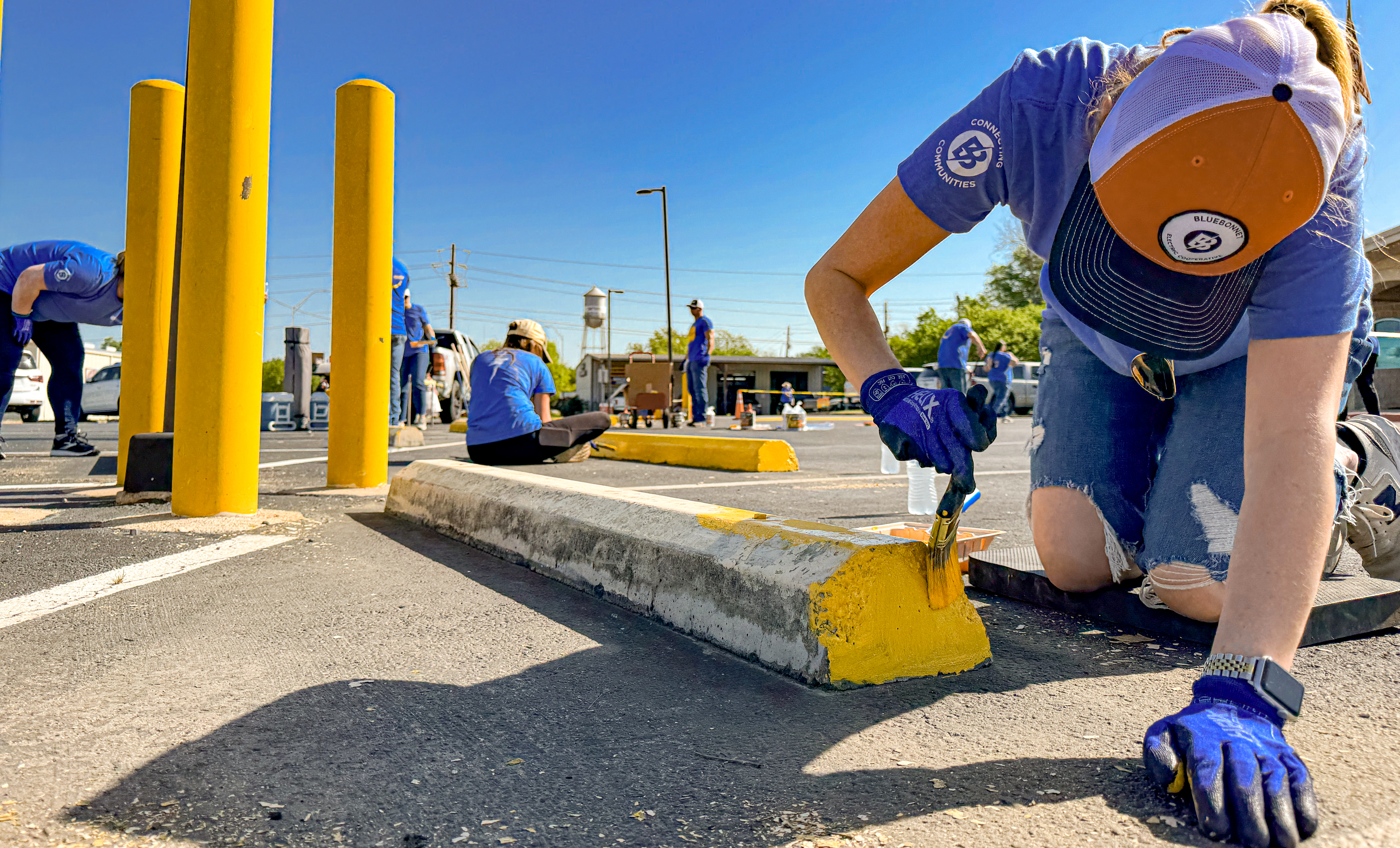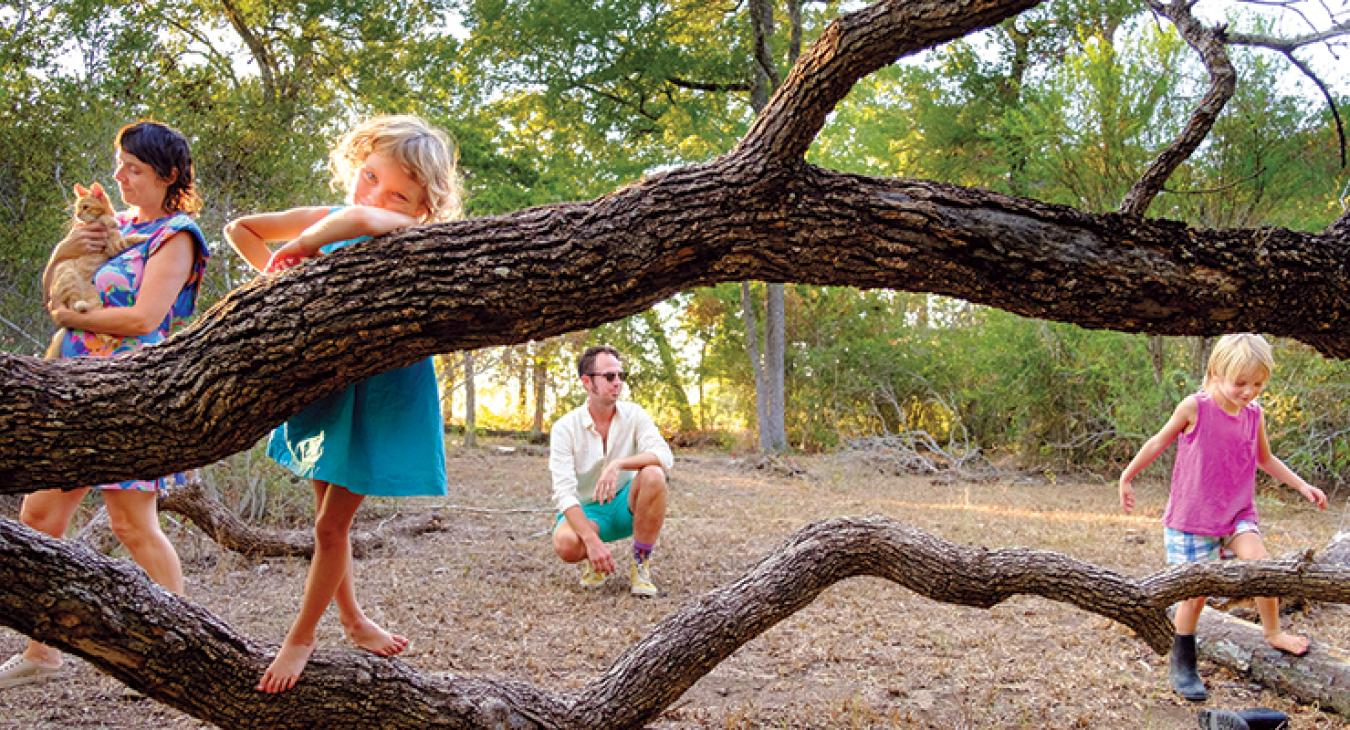Hollie and Davey Schacherl live on Starlove Ranch in Lee County, a regenerative animal sanctuary that is also a Hipcamp location with six tent or RV campsites. Their twin 5-year-olds, Oslo, left, and Ivan, play near their most popular campsite.
Call it hip camping or just a new way to enjoy nature on someone else’s beautiful land.
Stories by Addie Broyles Photos by Laura Skelding
Nature lovers have found a new way to sleep under the big, bright stars of Central Texas by camping on privately owned land discovered through the use of websites such as Hipcamp, The Dyrt, Tentrr and even Airbnb.
Hipcamp.com, the largest of the sites, started 10 years ago and expanded into Texas about seven years ago. Campers can browse diverse listings ranging from primitive sites without so much as a fire ring to glamping tents complete with electricity and running water.
Other sites, like thedyrt.com, let campers browse public and private campgrounds, and some public locations can be booked directly on the site. Even airbnb.com has expanded into the camping space in recent years.
Campgrounds have long been overseen by federal, state, county or regional park systems, or they’ve been privately operated. Many are in beautiful spots around the state, from riverfronts to canyons, the Gulf Coast to Big Bend. Now private landowners who may want to host only a couple of campers a night have found the websites can provide them with some supplemental income.
There are more than 50 small, private campgrounds in the Bluebonnet Electric Cooperative region listed on these websites. We talked with five landowners about how this industry has diversified their income stream, what they’ve learned about being good hosts and what it takes to let campers experience their slices of the Lone Star State, from the lush shores of the San Marcos River to an animal sanctuary in Dime Box to the fields of Bleiblerville.
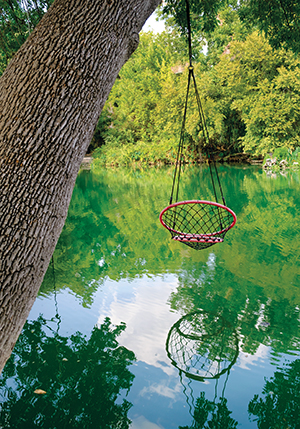
THE BEST DAM SPOT
Near Staples, on the San Marcos River,four tent sites, three acres, from $50 per night for two guests, on hipcamp.com; amenities include river access, outdoor shower, use of kayaks and paddleboards, portable toilet
As a child, Laura Grumbles spent long days on the San Marcos River. She never imagined that she’d spend her retirement hosting campers who flock to the emerald green river that keeps this northern pocket of Guadalupe County so lush.
The former preschool teacher grew up in Staples, between Martindale and Fentress, not far from the slow-moving water that, for many years, powered a cotton gin next to the small bridge that leads into town. In the late 1980s, when Grumbles was in college, her dad bought that gin, including the dam that controlled the water powering it, as well as a couple of acres along the river.
Her parents eventually moved into the small house next to the old gin, and Grumbles, her siblings and their growing families would often gather at this little slice of heaven to skip rocks, float down the small rapids and gaze up into towering trees.
The family knew that people with privately owned riverside properties like theirs had monetized their land by creating campsites, but their dad wasn’t keen on the idea.
‘‘Dad was so afraid of lawsuits,’’ Grumbles said. But when he died in 2019, at 92, “I looked at my sister and I said, ‘What are we going to do with this place?’ People say, ‘What a beautiful spot,’ but how can we share it without overloading it?”
The camping websites, following the Airbnb model, have provided enough income to allow some landowners to retain ownership of family property.
“Hipcamp has given the third generation a way to keep the family legacy intact,” Grumbles said.
At their handful of small campsites on the river’s gravel bar, there aren’t picnic tables or fire rings, because the river floods every few years. One of the sites, on higher ground near the gin, has a hammock and a picnic table. There’s also a portable toilet and a trash dumpster, which cuts into the profits but makes hosting guests less of a headache.
“If I could get the forecast of flooding from the good Lord, I’d have a bubblegum machine down there.” With more than 300 reviews, Grumbles’ “The Best Dam Spot” is one of the most popular privately owned Texas campsites listed on Hipcamp.
“Our venture into all this was born when outdoor life came back into everyone’s life,” she said. Although she sometimes deals with rowdy campers and tossed cigarette butts, being a host for up to four groups of campers is a joy. “I camped on that gravel bar with my son and his friends many times,” Grumbles said.
“My campers bring my childhood and my home life back alive. When we hear children laughing down at the gravel bar, it brings back fond family memories because we were able to have that with our children.” Guests have told her that overcrowded public campsites with paved roads jammed with vehicles make camping on private land alluring.
Some folks driving cross-country can more easily find camping locations along their routes. For others, being on private land brings a sense of security and an escape from crowds.
“We’ve met the most wonderful people — people who’ve become friends — and I feel bad charging,” she said. “It pays some of the property tax, and it’s fun to share.”
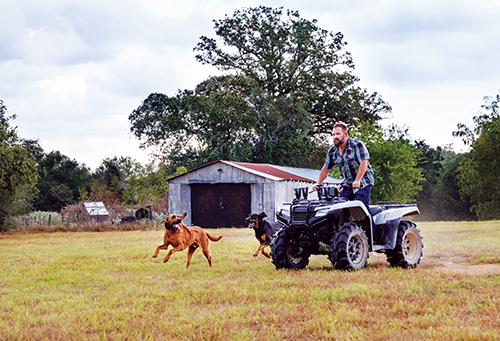
FIREFLY RANCH
Bleiblerville, Austin County, four tent sites, 22 acres, from $30 per night for four guests, listed on hipcamp.com; amenities include hike-and-bike, horse and off-road vehicle trails, and a portable toilet
Aaron Barnett grew up in the California mountains near Yosemite.
He had traveled the world, working in the oil and gas industry, and ended up in Houston with a career in biotechnology. Then he started looking for a piece of land where he could spend the next chapter of his life.
A single dad with a teenage son, Barnett settled on 60 acres of rolling hayfields with a farmhouse and an old barn in east Austin County near Bleiblerville. He thought about making the steel-roofed barn into a second dwelling, but instead decided to remodel the “rust bucket” into something he could share with people who come to the property via his listing on hipcamp.com.
Barnett wondered if his property could prove attractive to campers who prefer a primitive approach: no shower, no bathroom, no paved road to the campsite. “I learned that I’m not going to get hundreds of visitors, but there are a lot of folks who don’t have $500 for a camping trip,” he said.
Campers have come to his property while attending the Bellville knife show in April or competing in a local bike race. Some are “overlanding”: driving long distances and camping along the way, often in a camper van built for that purpose.
Even though the RV market has slowed since its peak during the pandemic, Barnett believes it will grow again. People still want to live on the road, work remotely or travel during their retirement years.
Barnett plans to make the barn a free, air-conditioned communal space – complete with Wi-Fi – for anyone who stays on the property. It can be used as an office, or a place to relax in comfortable chairs with a glass of wine to watch the sunset. He even plans to add a small stage so he can host live music and weddings, and guests can camp or stay in an RV, starting next year.
“The pandemic changed how a lot of us think about our future,” he said. “We spent all that time staring at the same four walls, and now lots of folks are thinking, ‘Maybe it’s time to go.’ ”
Even though Barnett has traveled the world, he likes the rolling hills of this part of Austin County best. “It’s way too pretty of a place for me to have it by myself and not share it,” he said.
“I searched for a year for this place,” Barnett said of his land, which is five minutes from a paved road. “Rush hour here is five John Deeres and three F-150s,” he said. Barnett nicknamed the place Firefly Ranch because of the countless lightning bugs that give it a special glow at night. “It feels like a million miles from anywhere,” he said. “The campers I’ve met are lovely people, and every one of them reacts the same way: ‘Oh wow, you’ve got this private park. How did you pull that off?’ ”
STARLOVE RANCH and SANCTUARY
Near Dime Box, Lee County, 102 acres, six RV and tent sites, from $35 per night for four guests, on hipcamp.com and thedyrt.com; amenities include biking and hiking trails, farm tours, rescue animals including cows and a potbellied pig, and a portable toilet
In Lee County, Hollie and Davey Schacherl are looking beyond corn, cotton and cattle to bring life to a little over 100 acres that have been in Davey’s family for more than 150 years.
Since 2017, they’ve operated Starlove Ranch and Sanctuary about 7 miles south of Dime Box, as a regenerative farm with more than 30 rescue cows, a potbellied pig named Norman and a hike-and-bike trail around the edge of the property.
Before the COVID-19 pandemic, the Schacherls hosted events at Starlove, but in 2020, when millions of Americans took to the road for camping and RV trips, the couple opened their property to campers through several websites, including Hipcamp and The Dyrt.
“We didn’t consider ourselves ready to open to the public, but the next day, we got a notification that a camper was coming,” Hollie said. “We scrambled to get things ready, and ever since, we’ve been further developing the space.”
Today Starlove has six campsites suited for either tents or RVs, and a new biodigester bathhouse that harnesses methane gas to fuel a kitchen range.
The couple had been living in Austin for about five years when they had twins, who are now 5 years old. They started to feel constrained by city life. Moving back to his family’s land was not something he’d ever considered, Davey said, until Hollie came into his life.
“I knew the line of succession was eventually going to pass to me, but it was never anything I had considered,” he said. “I have a lot of pride in being a Texan, and I like to be a Texan that breaks people’s preconceived notions of what Texans are. I feel prideful to still be here and still holding onto this property.”
As vegans, they wanted to shift away from raising cattle for beef production, which is how the family had paid property taxes in the past. “We knew we needed to monetize it in a new way,” he said.
They formed a nonprofit so people could donate to help cover the costs of feed to keep the cows on the ranch. They hosted events and set aside a portion of the property for paid campers.
“It’s been really cool that the people who have come out seem to be, typically, in alignment with what we’re doing,” she said. “We’ve had families and couples, van-life travelers, and small groups of youngsters, people in their 20s, coming out. I fight the urge to mother them. We walk the line of being helpful and available, and giving them space.”
Hollie, who grew up camping on public land in Oregon, said the private campground option is “really cool because there’s such individuality across the board. Every place has its own flavor, and you can see the landowner pour a bit of themselves into the space. There’s a bit of something for everybody.”
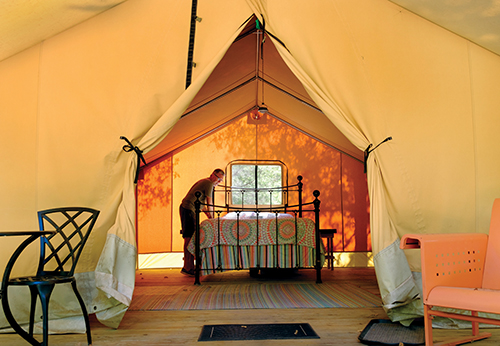
ARDOR WOOD FARM
Red Rock, Bastrop County, two tent sites, one glamping tent, $40 and $90 per night for two guests, listed on hipcamp.com, with more information at ardorwoodfarm.com; amenities include a new cedar outhouse with composting toilet, hiking trails, Nigerian dwarf goats, and a brick-and-stone labyrinth
Married retirees Graham Pierce and Karen Knight don’t spend much time resting on their 67-acre Ardor Wood Farm in southern Bastrop County.
About six years ago, Hipcamp was expanding and reaching out to landowners about becoming hosts. “I said, ‘Nobody wants to camp on a farm,’” said Pierce, who was raised on a farm in Ireland before moving to the United States for a career in medicine.
Knight talked him into creating a listing for the farm they bought in 2015. The first afternoon it was listed, a guest booked for the next day.
“I ran out with the tractor and mowed a place between some trees and created a campsite,” he said.
Over the next eight years, they added a second campsite and built a cedar outhouse with a composting toilet. They hung signs around the property, like the ones you might see at a public park, educating visitors about different species of plants and animals on the land.
While building the couple’s farmhouse, Pierce lived in a safari-style tent that is now the farm’s “glamping” tent, complete with a bed, tables, chairs, a private fireplace and an outdoor shower.
“I’m not an extreme tree hugger, but I do know we need to find a balance, so we’re trying to bring a lot of life back to the farm.”
The couple maintains four miles of trails through the forests and meadows, a small herd of Nigerian dwarf dairy goats in an enclosure near the farmhouse and a handful of Texas longhorns in one of the fenced-in fields.
They insist on meeting every guest to foster connection and talk about safety on rural land. “There are lots of ways for people to hurt themselves out here,” Pierce said.
One of his keys to private campground success is to offer add-ons for guests, such as bottle-feeding the baby goats or touring the property with Pierce, who is nicknamed “the Celtic Cowboy.”
On the tour, Pierce explains the importance of reducing invasive species and creating habitats to repopulate native ones, such as bobwhite quail and wild turkey. Pierce and Knight host classes and events for both campers and small groups that visit the farm but don’t stay overnight.
Those sessions align with the couple’s vision for the farm, including dinners, cheesemaking, and what Pierce calls “difficult conversations around the fire.”
“Karen and I are complete opposites in everything. We do see eye-to-eye on some things, but we are just different, and that’s what America is supposed to be.”
Pierce and Knight say their goal isn’t simply to host campers; they want to educate people about revitalizing the land through these conversations and hands-on activities.
The most amazing thing about becoming unexpected campground hosts has been meeting kids who, after two days, “are holding my hands saying they don’t want to leave,” he said. “When you take kids and people and you put them in nature, you disconnect to reconnect, with yourself or your spouse or your kids or anything. We think that’s the best therapy you can get.”
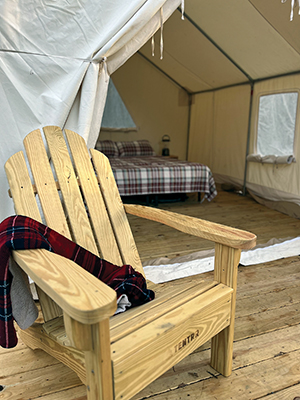
CAMP IDLE WILD
Near Caldwell, Burleson County, one glamping tent, $75 per night for six campers, listed on airbnb.com and tentrr.com; amenities include a queen-sized bed, camping gear, portable heater, portable toilet, sun shower, hiking trails
Lauren and Kendall Sawyers bought some land in Burleson County a few years ago and were content to do the “ag-life” thing.
“I jumped into raising Angora goats, and he’s raising cattle, but we have this land with a wooded area in the back with a pond and didn’t want to keep it to ourselves,” Lauren said. She found out about the all-in-one camping company Tentrr, which started in the Northeast.
The company ships kits that start at $4,900, which include a glamping tent, a wooden platform to set it up on and tables, to landowners like her. The kit makes setting up an attractive campsite easier.
“I loved the idea of people not having to haul all their camping stuff to come out here,” she said. “Here we are on a country road with miles of ranches in between you and another camper. It’s primitive, but you don’t have to bring anything,” she said.
The one glamping tent includes a camping toilet and a solar-heated outdoor shower. They provide wood for a fire and s’mores kits, and guests can meet the goats if they want. Lauren, a landscape architect, and Kendall, an electrical contractor, have two children.
They’ve added bedding and utensils for Camp Idle Wild guests, who need only to pack food and drinks in a cooler and “just show up.”
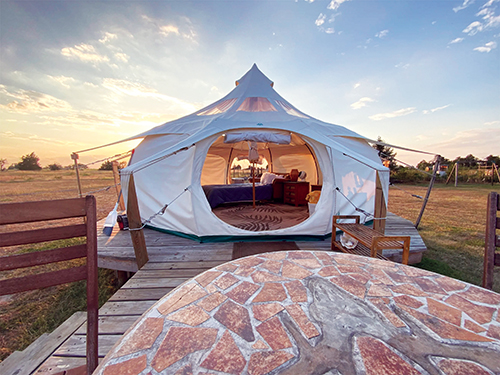
A few more private camping spots in the Bluebonnet area
Dozens of privately owned campsites are available in the Bluebonnet area. Here are a few listed on hipcamp.com or thedyrt.com that offer interesting settings and experiences.
- Sleep high above the ground at Robin’s Nest Treehouse in Caldwell County south of Lockhart. Campers can stay in a fully outfitted pad nestled among seven oak trees, complete with a cowboy hot tub (heated water in a stock tank) and air conditioning. Chill in a hammock, or borrow a canoe or a kayak to paddle around the on-site pond.
- On the San Marcos River is a vintage Shasta RV at Get Along Ranch in Martindale, across the river from the newly revitalized downtown, with its cafe and boutique grocery store. Bring a kayak or stand-up paddleboard and catch live music.
- In Austin County, you’ll find Life is Wonderful in New Ulm RV, a 20-by-50-foot place to park your fifth-wheel RV with full hook-ups and a view of a pasture. It’s within walking distance of the town square.
- In between Shelby and Latium, 10-acre Lucky Farm has three campsites, two RV sites and two glamping sites on the back five acres. Previous campers have noted how quiet and private the spaces feel, especially after all the hustle and bustle of the nearby Round Top Antiques Fair.
- In northern Bastrop County, not far from McDade, you’ll find the intentional homesteading community of Amazing Graze, whose residents invite visitors to stay in a bell-shaped glamping tent that overlooks a stock pond on this 40-acre farm. Guests also have access to a hammock, fire pit and saltwater Jacuzzi.
- Near the Bastrop and Fayette county line, Colorado River Camping offers 12 primative campsites, dispersed across the property, including one spot on an island that is accessible only by kayak, canoe or paddleboard. You can float to the property, too. There are no toilets, so bring your own bathroom bags or make arrangements with the host to rent the use of the bathrooms in the house.
- In eastern Travis County, SHAMBA Farm, short for Sustainable Homestead and Microclimate Based Agriculture, is a 10-acre farm and nature retreat that’s home to animals including goats, chickens, ducks and geese. Campers looking for a primitive site can learn about permaculture and sustainability from the owner, a yoga teacher, herbalist and beekeeper.
Want campers on your land? Here are tips
- Decide how many campsites and campers your land — and you — can reasonably handle.
- Start slowly, and think about creating a destination for people; give them something they want to see or do. Don’t just offer a piece of dirt. Even a shady creek or pond to fish in can be attractive.
- Give campers ideas for things to do in the area: where to eat, towns to visit, sites to see on their drive.
- Consider getting additional liability insurance. Many websites, including Hipcamp, Tentrr and Airbnb, offer insurance, but hosts who have numerous campers say they prefer extra protection.
- Learn about the Texas Agritourism Act. It can offer information and some liability protection for landowners who want to use part of their land as a tourism destination.
- Listen to your campers. Get their feedback about how to improve your listing or the campsite.
- Be a good host. Opening a campsite means you are in the hospitality business. Respond to campers’ messages quickly; greet them when they arrive.
Tips for campers going off the beaten path
- Read listings closely. If you must have a bathroom, make sure the listing with the beautiful photos has one. If you want to bring your dog, confirm that is allowed.
- Glass is rarely a good idea when camping, even if it is allowed.
- Always read the reviews. Your fellow campers will have lots to say about these campsites, but take reviews with a grain of salt. Leave your own review after your stay.
- Pack in, pack out. Camping on people’s private land does not mean they will clean up your mess. Bring trash bags, and unless told otherwise, take your refuse with you.
Shop the sites for unique area campsites
There are several popular websites to check out if you are looking for privately owned places to camp in the Bluebonnet Electric Cooperative region.
They include:
- Hipcamp (hipcamp.com)
- The Dyrt (thedyrt.com)
- Airbnb (airbnb.com)
- iOverlander (ioverlander.com)
- FreeRoam (freeroam.app)

